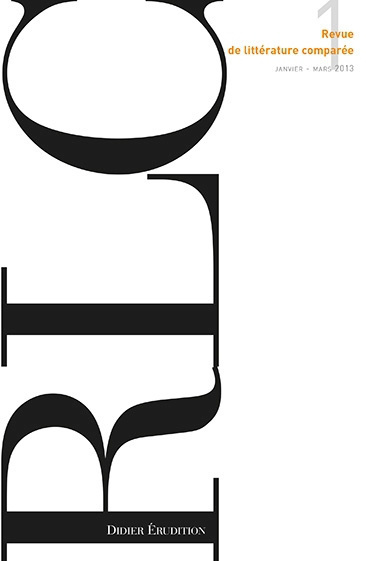Ignacio Ramos Gay, La Comédie-Française à Londres (1879) et la quête d'un Théâtre National Anglais (in English), RLC LXXXVII, n° 1, janvier-mars 2013, p. 5-16.
Le but de cet article est d'analyser les principes organisateurs de la Comédie Française pendant le dernier quart du XIXe siècle, tels qu'ils furent anatomisés par le critique du journal parisien Le Temps, Francisque Sarcey, dans le discours prononcé au Gaiety Theatre à l'occasion de la visite de la troupe française à Londres en 1879. On s'attardera, dans un premier temps, aux facteurs clés ayant contribué à faire de la compagnie, selon l'expression de Sarcey, un « ensemble parfait » conjuguant l'excellence sur scène avec une structure économique fondée sur la distribution démocratique des revenus et les subventions du gouvernement. Deuxièmement, on analysera l'impact de la Comédie-Française chez ses homologues britanniques, en faisant attention particulièrement à leur volonté d'utiliser la troupe française en tant que modèle d'un Théâtre National afin d'améliorer la qualité de l'art dramatique anglais.
Philippe Chardin, La Conscience de Zeno ou le livre blanc-noir de la psychanalyse, RLC LXXXVII, n° 1, janvier-mars 2013, p. 17-31.
Le grand roman d'Italo Svevo, cette œuvre extraordinairement lucide à une date précoce sur les réussites et sur les échecs de la psychanalyse, sera relu ici à la lumière des vigoureux affrontements récents entre les adversaires de la psychanalyse et ses défenseurs. La structure narrative du livre d'Italo Svevo est si subtile et si retorse que les uns et les autres peuvent se sentir confortés par cette lecture. Mais c'est sans doute la découverte des pouvoirs concurrents de la littérature de la mémoire qui représente à la fin de La Coscienza di Zeno le véritable dépassement de cette querelle autour de la psychanalyse.
Marc BOURDEILH, De l'Argentine à l'expatriation : Juan Rodolfo Wilcock, Silvia Baron Supervielle, entre continuité et rupture, RLC LXXXVII, n° 1, janvier-mars 2013, p. 33-47.
Pour des raisons liées à son Histoire, l'Argentine compte nombre d'auteurs expatriés, entre autres Juan Rodolfo Wilcock (1919-1978) en Italie ou Silvia Baron Supervielle en France. Habiles traducteurs, polyglottes, tous deux ont commencé leur itinéraire littéraire en Argentine et en espagnol avant de le poursuivre sur un autre continent et dans une autre langue. L'article montre que si Wilcock tourna la page de l'époque argentine et de l'espagnol, à l'inverse S. Baron Supervielle demeure attachée à sa langue maternelle et à son pays natal, constante source d'inspiration littéraire.
Marco Maggi, "Un semplice lume". Reflets de Dante (Caproni, Celan), RLC LXXXVII, n° 1, janvier-mars 2013, p. 49-61.
Entre aveu d'impuissance et ambition de signifier la vision béatifique, dans le semplice lume (« simple lueur ») du dernier chant du Paradis Dante nous donne l'image définitive de sa poésie. Comme d'habitude, ce sont les poètes qui en fournissent l'exégèse la plus profonde. Au XXe siècle, dans leurs réécritures de ce vers de la Divine Comédie, Giorgio Caproni et Paul Celan soulignent le drame de la parole qu'y est impliqué. C'est ainsi qu'une très ancienne tradition herméneutique de la conclusion du grand poème de Dante, abîmée pendant des siècles, émerge de nouveau.
Peter Morgan, Traduire le monde : la littérature reconnectée de Goethe à Gao (in English), RLC LXXXVII, n° 1, jan.-march 2013, p. 63-79.
Les études littéraires sont en crise. Les paradigmes nationaux, en tant que structures permettant d'organiser la recherche en littérature, ont fait leur temps, et le cadre institutionnel des études littéraires se fait de plus en plus comparatiste et mondial. En réponse à ces changements, nous assistons à une nouvelle convergence entre les universitaires et spécialistes de la littérature, et le « monde vécu » des lecteurs et écrivains, placée sous le signe de la « re‑connexion ». La question du langage et de la traduction, et non celle de la nation et de l'identité, est devenue source de développements approfondis pour les études littéraires. Les réflexions séminales de Johann Wolfgang Goethe sur la « Weltliteratur », au même titre que les considérations plus récentes de l'écrivain et intellectuel chinois, Gao Xingjian, fournissent un modèle pour penser le changement dans l'enseignement et l'étude de la littérature au sein des études littéraires contemporaines à l'échelle mondiale.
English version
Ignacio Ramos Gay, The Comédie-Française in London (1879) and the Call for an English National Theatre, RLC LXXXVII, n° 1, jan.-march 2013, p. 5-16.
This paper explores the principles governing the functional structure of the Comédie-Française during the last quarter of the century, as described by the Parisian critic of the Temps, Francisque Sarcey, in his address delivered at the Gaiety Theatre in 1879. I will examine the key factors that made the French company, in Sarcey's words, a perfect acting “ensemble” that combined high aesthetic concern with the financial advantages of democratic profit-sharing and government subsidies. Secondly, I will attend to the reactions of the French company's English counterparts, and their focus on consolidating a National Theatre committed to the Maison de Molière in the interest of elevating the artistic expertise of native dramatic art.
Philippe Chardin, Zeno's Conscience or the Black-White Book of Psychoanalysis (in French), RLC LXXXVII, n° 1, jan.-march 2013, p. 17-31.
Italo Svevo's great novel, an extraordinarily lucid book for its time about successes and failures of psychoanalysis, will be reread here in view of recent struggles between opponents of psychoanalysis and its defenders. The narrative structure of Italo Svevo's novel is so subtle and so twisted that each and every one can feel reassured by this reading. However, no one can doubt that it is, at the end of La Coscienza di Zeno, the discovery of competitive powers of remembrance in literature which truly overcomes the quarrel about psychoanalysis.
Marc BOURDEILH, From Argentina to expatriation: Juan Rodolfo Wilcock, Silvia Baron Supervielle, between continuity and break (in French), RLC LXXXVII, n° 1, jan.-march 2013, p. 33-47.
For historical reasons, Argentina has many expatriate writers, among others Juan Rodolfo Wilcock (1918-1978) who went to Italia or Silvia Baron Supervielle to France. Talented translators, polyglots, both of them have begun their literary path in Argentina, writing in Spanish before going on their way on another continent, using another language. The article shows that Wilcock turned the Argentinian page and didn't use any more Spanish, while Silvia Baron Supervielle is still attached to her mother tongue and to her native soil, constant source of literary inspiration.
Marco Maggi, “Un semplice lume”. Echoes of Dante (Caproni, Celan) (in French), RLC LXXXVII, n° 1, jan.-march 2013, p. 49-61.
Between confession of powerlessness and ambition to signify the divine vision, the semplice lume (‘simple lamp') of Paradise's last canto is the ultimate image of Dante's poetry. As it always happens, the most profound interpretation of it comes from the poets. In the XXth Century, in their re-writings of this verse from the Divine Comedy, Giorgio Caproni and Paul Celan highlight the drama of the word it supposes. With this, a very ancient hermeneutical tradition about the conclusion of Dante's poem, forgotten since centuries, appears anew.
Peter Morgan, Translating the World: Literature and Re-Connection from Goethe to Gao, RLC LXXXVII, n° 1, jan.-march 2013, p. 63-79.
Literary scholarship is in a state of crisis. The national paradigms have outlived their usefulness as the organizing structures for literary scholarship, and the institutional framework for literary study is becoming comparative and global. In response to these changes we are witnessing a new convergence between academic practitioners of literary studies and their “lifeworld” of readers and writers under the rubric of “re-connection.” Issues of language and translation rather than of nation and identity have become indicative of broader developments in literary studies. The seminal reflections of Johann Wolfgang Goethe on “Weltliteratur” together with the more recent considerations of the Chinese writer and intellectual, Gao Xingjian, provide models for change in the teaching and study of literature in contemporary global literary studies.




